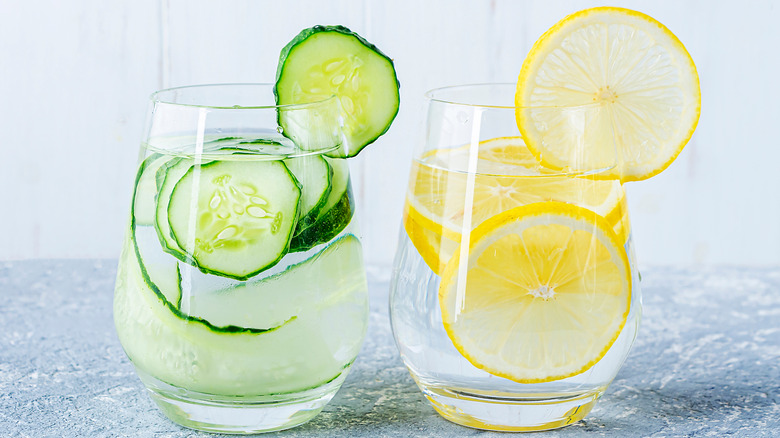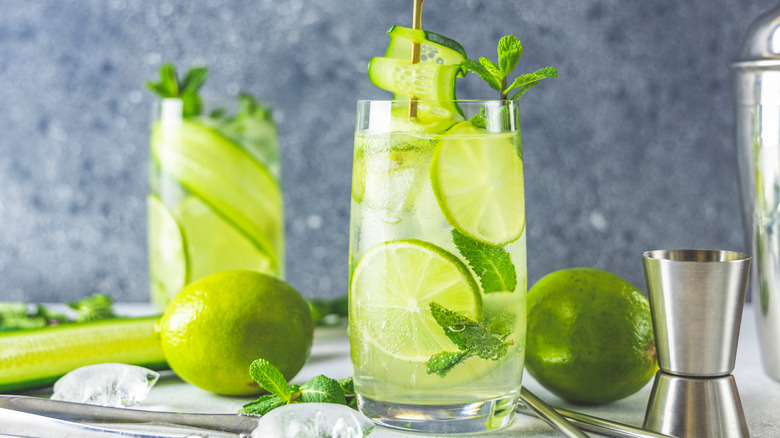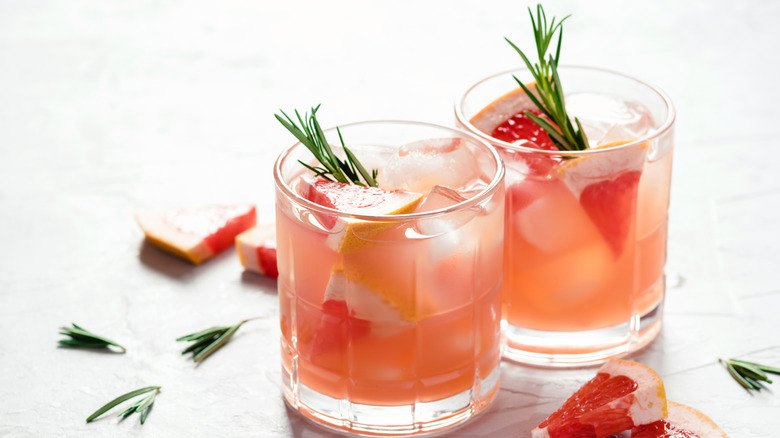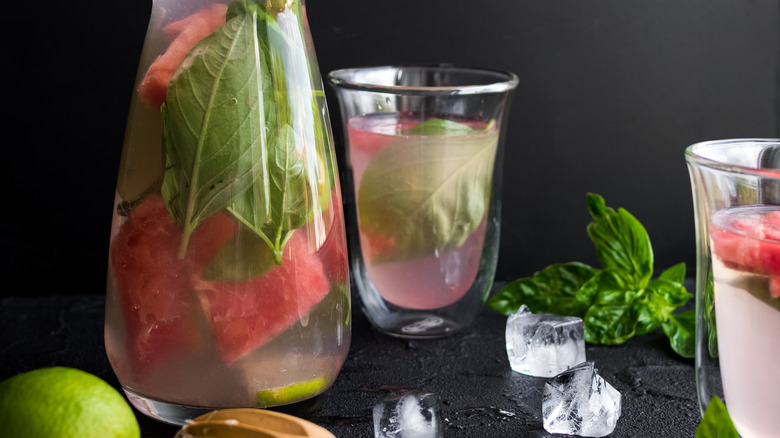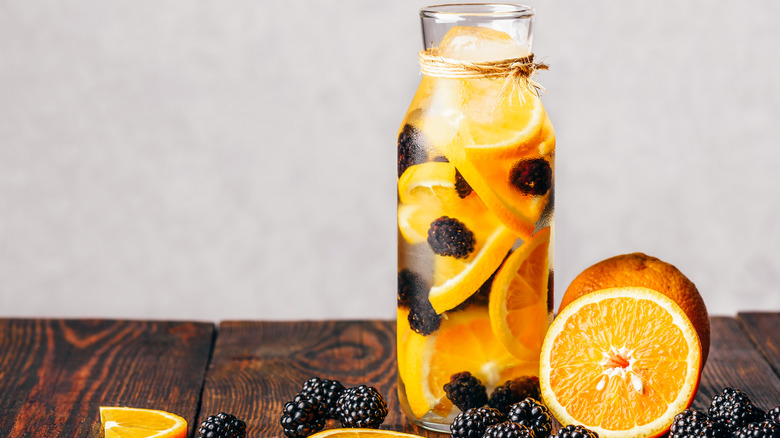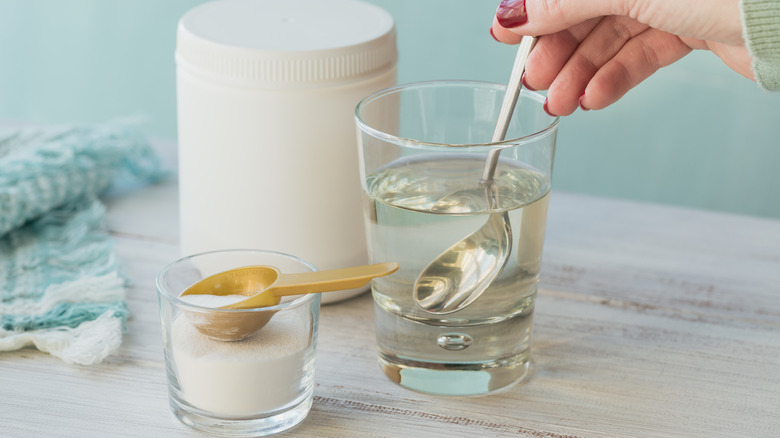Supercharge Your Morning Hydration With These 5 Water Recipes
Drinking enough water is vital for all of us to stay hydrated and function properly. After all, 60 percent of the human body is made up of water (via USGS). Since water is necessary to replenish our cells, not consuming enough water can lead to a myriad of issues — dehydration being the most common one. According to the Centers for Disease Control and Prevention (CDC), if you're dehydrated, it can bar you from thinking clearly, your body could become overheated, and you can experience mood swings. Moreover, dehydration could cause other conditions too, such as kidney stones and constipation.
When you drink water every day over an extended period can work wonders for your skin. Per a study published in the International Journal of Cosmetic Science, drinking nine cups of water every day for a month could significantly improve the appearance of a person's skin in terms of density and thickness.
On the other hand, if your daily water consumption is insufficient, it can adversely affect your skin in the long run. Dr. Steven Deliduka, an Illinois-based dermatologist, told Forefront Dermatology that "without adequate water intake, skin appears duller, and wrinkles and pores more prominent."
While it's best to drink water on its own, some people also like to infuse it with the juices of herbs and fruits to make things interesting.
What are the benefits of drinking infused water?
Water infused with herbs and fruits could benefit you in many ways by enhancing the nutritional value of the water. As explained by Healthline, a study suggests that when an adult drinks eight glasses of water per day (two liters), the intake could supplement 8 to 16 percent of their daily value for calcium and 6 to 31 percent of their daily value for magnesium.
However, a study shows that more than half of American adults do not drink the recommended glasses of water because they either don't record it, simply forget to do it, or are just too busy (via the New York Post). Therefore, infusing plain water with herbs and fruits could make it less boring and provide you with additional nutrients, such as vitamins and antioxidants.
Some may think that drinking cold water disrupts the digestive system, but water at any temperature has many health benefits. According to Prairie View A & M University (PVAMU), apart from being nutritious, infused water can provide you with several other benefits. For instance, it can help control your appetite, keep your blood sugar regulated, prevent heartburn, strengthen your immune system, and help you manage weight. What's more, infused water can help you get rid of headaches, keep your digestive system healthy, and can freshen up your breath. Some types of infused water — for example, lemon-infused water — could also be very good for your skin's texture and appearance (Via PVAMU).
If you're looking for infused water ideas but not sure where to start, here are five recipes you can try and that, if you like them, can make part of your morning hydration routine.
Cucumber and mint water
According to Five Heart Home, adding cucumber slices and mint leaves to plain water can make a very refreshing drink. And the best part is that it's easy, quick, and inexpensive, too. All you have to do is get a small or medium cucumber, wash it properly, and cut it into thin slices. Next, wash and bruise two sprigs of fresh mint, and add both the ingredients to a pitcher containing 10 cups of water. While this would make an excellent morning drink, the concoction can last more than a day.
Aside from keeping you hydrated, you can reap the maximum benefits of cucumbers, which are high in antioxidants, such as vitamins A and K, phosphorus, calcium, magnesium, and potassium (via Medical News Today). Akin to that, mint is also a very healthy option as it contains vitamin A, iron, manganese, and folate. Mint is also said to be beneficial in improving irritable bowel syndrome, relieving indigestion, and helping in weight loss (via Healthline).
Grapefruit and rosemary water
Many people haven't tried this one, as it's less popular than other infused water recipes, but adding grapefruit and rosemary leaves to water can make a refreshing drink to rejuvenate your mind (via MindBodyGreen). To prepare this concoction, all you need is half of an unpeeled grapefruit cut into slices, three to four sprigs of rosemary, and 10 to 12 glasses of water in a pitcher. You can also add ice cubes to the drink if you prefer.
According to WebMD, Grapefruits are rich in several protective nutrients, such as vitamin C, vitamin A, calcium, and iron. They help boost a person's immune system, aid in weight loss, help in regulating blood sugar levels, and can help prevent kidney stones. On the other hand, rosemary, which has been used in traditional medicines for hundreds of years, contains manganese, carnosic acid, phytochemicals riboflavin, niacin, and thiamin (via WebMD).
These nutrients help relieve gastronomical problems, help alleviate stress and anxiety, can reduce inflammation, and can also work as an expectorant to treat respiratory problems (via Intrepid Mental Health).
Watermelon and basil water
Another delicious infused water recipe that can quench your thirst and leave you thoroughly refreshed includes watermelon and basil. All you have to do is add ⅓ cup of seedless watermelon cubes and about six basil leaves into a pitcher and add about 10 cups of water to it. If you want, you can keep this mixture in the refrigerator or add some ice when you drink it (via A Sweet Pea Chef).
As Healthline explains, watermelon is good for your health because it's packed with vitamin A, vitamin C, potassium, and magnesium. That aside, this fruit has a high water content, which makes it naturally refreshing. Consuming this fruit along with water will not only keep you thoroughly hydrated and energized but also good for heart health, may help reduce oxidative stress and inflammation, is good for the eye, and can also help relieve muscle soreness.
Similarly, since basil leaves contain manganese, vitamin K, iron, folate, and omega-3 fatty acids, among other nutrients, they can provide protection against harmful bacterial growth and can act as an anti-inflammatory agent. According to Seattle Sutton, basil leaves are also rich in two flavonoids called orientin and vicenin, which help "protect cell structures as well as chromosomes from radiation and oxygen-based damage."
Orange, ginger, and blackberries
Another energy-inducing infused water recipe you can try to stay hydrated includes mixing oranges, ginger, and blackberries with plain water. For this recipe, you will need ½ pint of blackberries, one piece of freshly peeled and thinly sliced ginger, and one orange cut into thin slices. Add these fruits and herbs to a pitcher containing 10 to 12 glasses of water (via Culinary Hill), and you're done. You can consume this refreshing drink early in the morning, in the afternoon, or after the gym.
As far as the health benefits of the ingredients go, ginger is full of vitamins and minerals, including vitamins B3 and B6, potassium, phosphorus, zinc, and iron, among others. According to Everyday Health, consuming ginger can help you fight nausea, help soothe an upset stomach, relieve menstrual cramps, and aid in preventing the common cold.
Likewise, oranges are rich in vitamin C, vitamin A, and potassium (via WebMD), and blackberries are rich in vitamin K, vitamin C, manganese, and fiber (via Healthline).
Collagen water
As the name suggests, this concoction contains collagen, a protein found in skin, bones, and connective tissue. This protein is also responsible for rendering elasticity to your skin, making it look plump and healthy. As Healthline explains, collagen can do wonders for your skin, hair, nails, and your bones. That apart, it helps in "tissue repair, immune response, cellular communication, and cellular migration."
While the human body is capable of making collagen, the process decreases with age. "Collagen is what keeps our skin from sagging, giving us that plump, youthful look," Dr. Ohara Aivaz, a board-certified cosmetic and medical dermatologist from Los Angeles, told Cedars-Sinai's blog. "Starting in our mid-20s, we slowly begin to lose collagen. For women, we can lose up to 30 percent of our collagen production in the first five years of menopause."
For this recipe, all you'll have to do is grab a glass of water (preferably cold water for a refreshing taste), stir in some powdered collagen, and voila (via MindBodyGreen).
